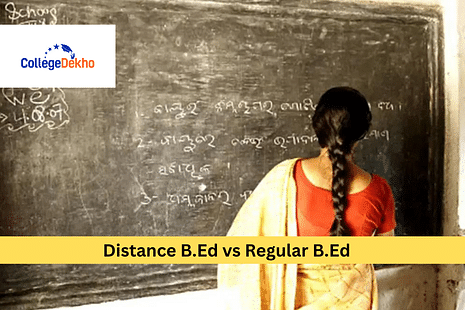Distance B.Ed vs Regular B.Ed is a common debate among students who wish to pursue a B.Ed course. While some prefer the convenience of distance learning, many students are more inclined towards classroom teaching. Explore the distinctions between a regular B.Ed and a Distance B.Ed!

The process of learning has undergone significant transformations in recent decades. The conventional methods of learning have been revolutionized, making it easier for students to obtain degrees from the comfort of their homes. With numerous degree courses offered in distance mode, students can now pursue their education without attending college regularly, simultaneously gaining work experience and earning extra income. This approach positions them favourably among their peers who pursued degrees through traditional methods.
Even the
B.Ed course
has not remained untouched by this evolution. Many institutions now offer the B.Ed degree in distance mode, which has been gaining popularity among graduates. However, teaching is distinct from other professions as it demands a balance of theoretical knowledge, practical skills, and significant on-field experience.
This brings forth the question of whether the distance B.Ed program truly benefits candidates. In this article, we will explore various perspectives to ascertain whether a regular B.Ed degree or a
distance B.Ed programme
is a more suitable option for students.
Difference Between Regular B.Ed vs Distance B.Ed
Candidates who are confused between regular B.Ed and distance B.Ed should check out the table below to find out the differences between the regular B.Ed and distance B.Ed courses:
Particulars | Regular B.Ed Programme | Distance B.Ed Programme |
|---|---|---|
Duration of Programme | 2 Years | 2 to 5 Years |
Eligibility Criteria |
|
|
Entrance Exams | ||
Average Course Fee | INR 50,000 to INR 2 Lakh per annum | INR 20,000 to INR 1 Lakh per annum |
Top Universities/ Institutions |
|
|
How Regular B.Ed Degree is Different from Distance B.Ed?
Except for the differences mentioned in the table below, there are some other differences between the regular B.Ed programme and distance B.Ed programme which have been pointed out in the table provided below -
Regular B.Ed Programme | Distance B.Ed Programme |
|---|---|
|
|
Pros of Pursuing Regular B.Ed
The advantages or pros of pursuing a regular B.Ed degree study have been listed below -
The regular mode of study imparts sound knowledge of various aspects of teaching to the trainee teachers
The trainee teachers are taught the course materials through various innovative teaching and learning strategies
The regular mode of study prepares the teacher trainees for various types of problems that might arise inside a classroom
In regular mode, the trainee teachers learn the importance of pedagogical analysis
Cons of Pursuing Regular B.Ed
Here are some cons of pursuing a B.Ed degree study from regular mode -
- The B.Ed degree study in regular mode is not beneficial for those who have already served in any institution (Government or Government-aided) for at least 1 year. It will benefit the freshers only.
- The candidates have to score a minimum aggregate of 50% in graduation or 55% in their postgraduation to pursue a B.Ed degree study from regular mode.
Pros of Pursuing Distance B.Ed
There are certain advantages of pursuing a B.Ed degree study in distance mode some of which are mentioned below -
Candidates can work in part-time mode while at the same time pursuing their B.Ed degree study
The candidates can save money as ODL does not require the candidates to visit the college/institution regularly
The candidates can invest the time saved in some other productive work because in the end - Time is Money
The candidates have the freedom to learn at their own pace
The candidates can study whenever and from wherever they want
Cons of Pursuing Distance B.Ed
There are, however, some cons or disadvantages regarding B.Ed degree study from distance mode some of which are listed below -
Candidates can easily get distracted very often due to the absence of a mentor or lecturer
Many schools prefer to recruit those teachers who have a regular B.Ed degree
Practical experience in distance learning mode is negligible compared to regular learning mode
The chance of networking in distance learning mode is much less
The credibility of the B.Ed degree obtained through distance learning mode can sometimes be questionable
There are several hidden costs which are seldom spoken about
In all, both regular and distance B.Ed have different pros and cons. Students are advised to choose the course mode depending on their career aspirations, financial conditions, and comfort level. Despite the mode of B.Ed which a candidate chooses, skills and subject knowledge matter in the teaching profession.
Regular B.Ed Colleges in India
The list of the regular B.Ed colleges in India has been provided below and students can go through it to find a suitable college to study the regular B.Ed course.
Name of the College | Location/ City |
|---|---|
Delhi University | Delhi |
Jamia Millia Islamia | Jamia Nagar, Delhi |
K.R. Mangalam, University | Gurugram |
Guru Gobind Singh Indraprastha University | Indraprastha, Delhi |
Galgotias University | Greater Noida |
Ganga Institute of Education | Jhajjar, Haryana |
Shyama Prasad Mukherji College for Women | Punjabi Bagh, Delhi |
Career Infotech Solutions | Saket, Delhi |
Benaras Hindu University | Varanasi |
Teerthanker Mahaveer University | Moradabad |
CCSU - Chaudhary Charan Singh University | Meerut |
University of Lucknow | Lucknow |
Mangalayatan University, Aligarh | Aligarh |
KJ Somaiya College of Education | Vidya Vihar |
Deen Dayal Upadhyaya Gorakhpur University | Gorakhpur |
D.Y. Patil University School of Education | Navi Mumbai |
TISS - Tata Institute of Social Sciences | Deonar |
Bombay Teachers Training College | Mumbai |
Chembur Sarvankash Shikshan Shastra Mahavidyala | Chembur |
St. Teresas Institute of Education | Mumbai |
KK University | Nalanda |
D.S. College | Kathiar |
Sunderwati Mahila College, Tilka Manjhi | Bhagalpur |
Magadh University | Gaya |
Forbesganj College | Purnea |
LMMU - Lalit Narayan Mithila University - Bihar | Bihar |
Patna Women's College | Patna |
Nalanda Open University - NOU | Bihar |
Patna Women's Training College, Patna University | Patna |
S.P. Jain College, Veer Kunwar Singh University | Sasaram |
Distance B.Ed Colleges in India
In India, there are a few colleges that offer the B.Ed course in distance education mode. From the table below find out the list of distance B.Ed colleges:
Name of the College | Location/ City |
|---|---|
Indira Gandhi National Open University | Delhi |
National Correspondence College | Calicut |
Annamalai University DDE | Tamil Nadu |
UP Rajarshi Tandon Open University (UPRTOU) | Prayagraj |
Rabindranath Tagore University | Kolkata |
Jammu University | Jammu |
Lovely Professional University | Jalandhar |
Directorate of Distance Education, Kurukshetra University | Haryana |
Netaji Subhas Open University | Kolkata |
Related B.Ed Articles
Thus, the above article clearly compares regular B.Ed degree programmes and distance B.Ed degree programs. Now, it depends upon the individual to choose which suits him or her the most.
For more such articles, stay tuned to CollegeDekho .
Are you feeling lost and unsure about what career path to take after completing 12th standard?
Say goodbye to confusion and hello to a bright future!

FAQs
The requirements for the regular B.Ed course are that graduate applicants should have a minimum aggregate of 50% in their qualifying exam and postgraduate applicants should have minimum aggregate marks of 55% in their qualifying exam and a valid entrance exam score.
Some good colleges for pursuing the distance B.Ed course are Indira Gandhi National Open University (IGNOU), Mysore Correspondence College, Annamalai University, Netaji Subhash Open University, Nalanda Open University, etc.
Applicants should have a Bachelor’s/ Masters degree in Engineering/ Science/ Commerce/ Arts stream from a recognised University. Those who have a minimum of 2 years of teaching experience in upper primary/ primary schools are also eligible to apply.
The practical aspect of the B.Ed degree study is the most important thing as theoretical knowledge can be gained via distance learning also.
Well, it is recommended that to become successful teachers, the candidates should opt for a regular B.Ed degree programme, However, there are certain things that you can do while pursuing your B.Ed degree from correspondence mode like joining online courses and professional development workshops to enhance your learning.
The In-service Elementary Teacher” category comprises those individuals who are currently teaching in elementary schools or at the elementary stage of education.
Yes, a B.Tech graduate can also apply for the B.Ed programme as per the latest decision taken by the National Teacher’s Educational Council (NTEC).
The candidates must always look to pursue their B.Ed degree studies in regular mode from a recognised University/ institution to be placed in a much better position as per the B.Ed experts.
Some of the B.Ed entrance tests to pursue the regular B.Ed course are JUEE, IGNOU BED, DU B.Ed/ CUET, IPU CET, RIE CEE, UP B.Ed JEE, Guwahati University B.Ed Entrance Test, Bihar B.Ed CET, ITM NEST, etc.
Was this article helpful?


















Similar Articles
Mumbai University MAH B.Ed CET 2025 Cutoff
Ambedkar Marathwada University MAH B.Ed CET 2025 Cutoff
Ramanand Teerth Marathwada University MAH B.Ed CET 2025 Cutoff
Shivaji University MAH B.Ed CET 2025 Cutoff
What is a Good Score & Rank in MAH B.Ed CET/ ELCT 2025?
MAH B.Ed Question Paper 2025: Unofficial Answer Key, Exam Analysis